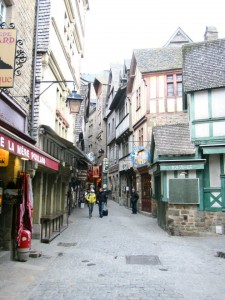If I were to ask you about the attractions you know about in France, I bet you could at least name a few in Paris: The Eiffel Tower, le Louvre, l’Arc de Triomphe, les Champs-Elysées, maybe even Montmartre and le Moulin Rouge? Could you name any outside of Paris?
Le Mont Saint Michel is probably the number one attraction outside of Paris that people recognize. In fact, it’s one of the most visited sites in the world. That’s not too hard since France is the country that is most visited in the entire world (the United States is number 2).
In October of my year abroad, my Rotary district in France (districts envelop different areas of the country, and in my district there were about 22 exchange students) planned a trip for us students to travel up North to visit the Mont Saint Michel. About 5 or 6 other districts were planning to do the same, so we were all really excited to meet with tons of other students.
We set out on a Friday from Bourges (the town in which I was living) to Normandy, the uppermost area of France. We met with the rest of our exchange students at the beach, and ate sandwiches and played in the chilly water. Later, we went on a tour at a WWII museum which was right next to the artificial port that was created for the American soldiers to land on and invade Normandy. Not far from that, there’s an American cemetery which we visited. There, we met an American soldier who had actually fought in Normandy, and tears were in his eyes as he helped fold the American flag.
After this emotional experience, we hopped back into our vans and drove an hour to our hotel which was right outside the Mont Saint Michel.
A little bit of history: Le Mont Saint Michel is an island commune just a kilometer away from mainland France. In medieval times, it was used as a fortification because it could only be accessed during low tide. When enemies tried to reach it during high tide, they would drown.
Currently, the commune has a population of 42 people!! Wouldn’t it be cool to live there..? No? Just me then. The French government is also trying to figure out a solution to the island’s main problem: it’s sinking into the surrounding soil and water!
For some reason the Rotarians made all of us 200 exchange students walk around the island in the ice cold water for about 3 hours. We didn’t mind though, it was the perfect opportunity to get to know the rest of the students and take pictures with out countries’ flags.
Later that night, all the students and Rotarians piled into one room to eat dinner, and once we finished our meals, the Rotarians had us go to the front of the room in groups and sing our country’s national anthem. This took roughly 2 hours to get through everyone’s anthem, but it was fun to hear the students sing in different languages. After that it was dance party time.
I still think of this weekend as one of the best weekends during my exchange. I got to see a beautiful place that I normally would never have gone to because it was too far away from my city, and I got to meet so many different people from around the world, people whom I still follow on Facebook to check out what they’re up to. But mostly, I became much closer with the exchange students in my district, especially these 4 girls, with whom I became super close with during the rest of the year. My exchange wouldn’t have been half as great as it was without the support and friendship of these girls! As much as I love my French friends I made at school, it’s the exchange students who really understood me and got to know me better. And I miss ’em to death!


























